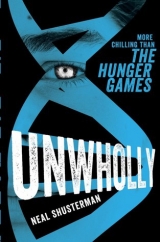
Текст книги "UnWholly"
Автор книги: Neal Shusterman
сообщить о нарушении
Текущая страница: 5 (всего у книги 27 страниц)
The guards, who have been watching from the door, race in and help him up.
“Are you all right, sir? Should we call for help, ma’am?”
“That won’t be necessary. I’ll tend to him.”
They bring him to a plush sofa. He’s shivering now, not just from the chill in the air, but from the revelation of knowing his own personal truth. Roberta grabs a throw blanket and covers him. She orders the room be made warmer, and she sits beside him like a mother comforting a feverish child.
“There are big plans for you, Cam. But you don’t have to worry about that now. Right now, all you have to do is build that amazing potential; rope in all those parts of your mind that are still stray; teach every part of your body to work in concert. You are the conductor of a living orchestra, and the music you’re going to make will be beyond spectacular!”
“What if it’s not?” he asks.
Roberta leans over, kissing him gently on the forehead. “Simply not an option.”

ADVERTISEMENT
“When I lost my job, bills and debt began to pile up, and I didn’t know what to do. I didn’t think there was any way to provide for my family. I even thought about going to an offshore harvest facility and dividing myself on the black market to pay for my family’s expenses, but the black market scared me. Well, at last there’s a proposition on the ballot to legalize voluntary adult unwinding—something that would provide my family with money enough to survive. Imagine that! I could enter the divided state with peace of mind, knowing my family would be provided for—and by legalizing it, the black marketers will be put out of business. Vote yes on Prop 58! Help families like mine, and put an end to parts pirateering.”
Paid for by the National Alliance of Donor Advocates

Cam’s dreams are always lucid. He always knows that he’s dreaming, and until now his dreams have been a source of intense frustration. They don’t follow dream logic—they don’t follow any logic—they are disjointed, disconnected, and confused. Snippets of randomness strung together by the cobweb of his unconscious mind. His dreams feel like channel surfing through mental stations so quickly, it’s impossible to grasp the concept of any one thought-byte. Maddening! However, now that he knows the nature of his being, Cam finds that he’s able to ride the wave.
Tonight he dreams he’s in a mansion. Not the one overlooking the ocean, but one in the clouds. As he moves from room to room, it’s not just the decor that changes, but the world as well—or rather, the life he’s living within that world. In a kitchen, there are siblings he recognizes sitting at a table waiting for dinner. In a living room, a father asks him a question in a language that didn’t make it into his brain, so he can’t answer.
And then there are the hallways—long hallways with rooms on either side, containing people he knows but only slightly. These are rooms he will never enter, and those people will never be more than images, trapped in those rooms. No further memory of them exists, or at least not within the cortical tissue he received.
In each room and hallway he moves through, Cam feels an intense surge of loss, but it’s balanced by the anticipation of the many rooms ahead.
At the end of the dream, he finds a final door opening on a balcony with no railing. He stands at the edge, looking down into billowing clouds below, shredded and reformed by the forces of some sentient wind. Within him a hundred voices—the voices of those who are a part of him—all speak to him, but their many voices have blurred into an unintelligible rumble. Still, he knows what they’re trying to tell him. Jump, Cam, jump! they’re saying. Jump, because we know you can fly!
• • •
In the morning, still high from the dream, Cam pushes himself harder than he ever had before in physical therapy. He feels the burn in his muscles now rather than the strain on his healing wounds.
“You’re at the top of your game today,” Kenny tells him as he treats Cam’s joints with a repeating cycle of ice and heat to speed the healing. Kenny, Cam has learned, was a top trainer for the NFL, but the powerful friends of whom Roberta spoke hired him to train a single client, offering him top dollar.
“Money talks,” Kenny had to admit. “Besides, it’s not every day you get to be part of history in the making.”
Is that what I am? Cam thinks. Future history? He tries to imagine the name Camus Composite-Prime taught in future classrooms, but it doesn’t stick. It’s the name. It sounds too clinical, like the subject of an experiment rather than the result. He ought to shorten it. Camus ComPri. The images of race cars speeding around a bend soars through his mind. The Grand Prix. That’s it! Camus Comprix. Silent S, silent X—a name that holds as many secrets as he!
He grimaces as Kenny ices his shoulder, but today, even that pain feels good.
“Pie-marathon, no more basket!” he says, then clears his throat and allows the thought to congeal, gathering the proper words. “This marathon I’m on . . . now it’s as easy as pie. Not feeling wasted at all.”
Kenny laughs. “Didn’t I tell you it’d get easier?”
This afternoon Cam sits on the balcony with Roberta, and they’re served lunch on silver trays. Each day the foods have greater variety, but they’re always in small portions. Shrimp cocktail. Beet salad. Chicken curry with couscous. All delicious challenges to his taste buds, sparking micro-memories and forcing neural connections to accompany his acute senses of taste and smell.
“All a part of your healing,” Roberta tells him as they eat. “All a part of your growth.”
After lunch, they sit for their daily ritual before the digital tabletop, taking in images to stimulate his visual memory. The images are more complicated now. Nothing so easy as the Eiffel Tower or a fire truck. There are obscure works of art that Cam must identify—if not the actual work, then at least the artist. Scenes from plays.
“Who is the character?”
“Lady Macbeth.”
“What is she doing?”
“I don’t know.”
“Then make something up. Use your imagination.”
There are images of people in various walks of life, and Roberta asks Cam to imagine who they might be. What they might be thinking. Roberta doesn’t allow him to speak until he has taken a moment to find the proper words.
“Man on a train. Wondering what’s waiting at home for dinner. Probably chicken again. He’s sick of chicken.”
Then, amid the pictures strewn across the computer tabletop, Cam sees an image of a girl that catches his attention. Roberta follows his eyes to the image, and she immediately tries to wipe the image away, but Cam grabs her hand and stops her.
“No. Let me see.”
Reluctantly Roberta takes her hand from the image. Cam drags it toward him, rotates it, and enlarges it. He can tell the picture was not taken with the girl’s permission. It’s framed at an odd angle. Perhaps taken secretly. A memory flashes. This same girl. On a bus.
“That picture is not supposed to be here,” Roberta says. “Can we move on now?”
“Not yet.”
Cam can’t quite tell where the picture was taken. It’s outdoors. Dusty. The girl plays a piano under something dark and metallic that shades her. The girl is beautiful.
“Clipped wings. Broken heaven.” Cam closes his eyes, remembering Roberta’s order that he find the proper words before he speaks. “She’s like . . . an angel damaged when she fell to earth. She plays music to heal herself, but nothing can heal her brokenness.”
“Very nice,” says Roberta unconvincingly. “On to the next one.”
Roberta reaches over and tries to drag the picture away again, but Cam slides it to his corner of the table, out of her reach. “No. Stays here.”
The fact that Roberta is bothered by this just makes Cam more curious. “Who is she?”
“Nobody important.” But clearly from Roberta’s reaction she is.
“I will meet her.”
Roberta chuckles bitterly. “Very unlikely.”
“We’ll see.”
They get on with their mental exercises, but Cam’s mind stays on the girl. Someday he will find out who she is and meet her. He will learn everything he needs to know, or more accurately, unify and organize all the things that are already there in his fragmented brain. Once he does, he’ll be able to speak to this girl with confidence—and then, in his own words, and in whatever language he needs to, he’ll be able to ask her why she looks so sad, and what unfortunate twist of fate has left her in a wheelchair.
Part Two

Whollies
34 CHILDREN ABANDONED UNDER NEBRASKA’S SAFE-HAVEN LAW
by Nate Jenkins, The Associated Press
Friday, November 14, 2008
LINCOLN, Neb. (AP) Nebraska officials geared up Friday for a special legislative session designed to deal with a unique “safe haven” law whose unintended consequences have allowed parents to abandon nearly three dozen children as old as 17.
As the session to correct the law approached, a 5-year-old boy was dropped off at an Omaha hospital on Thursday night. Earlier in the day, a woman dropped off two teenagers at another Omaha hospital, but one of them, a 17-year-old girl, fled. Authorities have not found her yet.
As of Friday afternoon, 34 children had been abandoned under the Nebraska law, five of them from other states.
Nebraska was the last state to enact a safe-haven law, intended to take in unwanted newborns. But unlike laws in other states, Nebraska’s doesn’t include an age limit.
Some observers have interpreted the current law as applying to children as old as 18.
The full article can be found at:
http://articles.nydailynews.com/2008-11-14/news/17910664_1_safe-haven-law-omaha-hospital-unique-safe-haven-law
4 • Parents
They’re together as they open the door. A father and mother, dressed for bed. Worry lines fill their foreheads as they see the nature of their visitors. This is an anticipated yet unexpected moment.
A Juvey-cop stands at the door with three plainclothes officers to back him up. The lead Juvey-cop is young. They all seem young. They recruit them earlier and earlier these days.
“We’re here to process Unwind subject 53-990-24. Noah Falkowski.” The parents glance at each other in alarm.
“You’re a day early,” the mother says.
“The schedule has been pushed up,” the lead cop tells her. “We have the contractual right to change the pickup date. Can we please have access to the subject?”
The father takes a step forward to look at the name on the officer’s uniform.
“Look here, Officer Mullard,” he says in a loud whisper, “we’re not prepared to surrender our son just yet. As my wife has told you, we were expecting you tomorrow. You’ll have to come back then.”
But E. Robert Mullard waits for no one. He barges into the house, with his team following behind him.
“Good God!” the father says. “Have some decency.”
Mullard lets out a guffaw. “Decency? What do you know about decency?” Then he looks down the bedroom hallway. “Noah Falkowski!” he calls loudly. “If you’re back there, come out now.”
A fifteen-year-old boy peeks out of a bedroom doorway, takes one look at the guests, and slams his door. Mullard signals to the brawniest of his cohorts. “He’s all yours.”
“I’m on it.”
“Stop him, Walter!” the woman begs her husband. Walter, put on the spot, turns to Mullard with a vengeance. “I want to talk to your superior.”
And then Mullard pulls out a gun. “You’re in no position to make demands.”
It’s clearly just a tranq pistol, but considering that nasty business about the Juvey-cop killed with his own gun, Walter and his wife aren’t about to take any chances.
“Sit down,” Mullard says, nodding toward the dining room. The couple hesitates. “I said sit down!” And then two of Mullard’s team force them to sit in two dining room chairs. The father, a reasonable man, assumes he’s dealing with another reasonable young professional like himself.
“Is this all really necessary, Officer Mullard?” he asks, in a calmer, more accommodating tone.
“My name isn’t Mullard, and I’m not a Juvey-cop.” Suddenly it hits the man how obvious this is. He knew this kid was too young to have that kind of authority. The scars on his face made him seem a little . . . well . . . seasoned, but still he was too young. How could Walter have been so easily fooled? And isn’t there something familiar about this young man’s face? Has he seen him before, possibly in the news? The man is rendered speechless by this unexpected turn of nonprofessional events.
5 • Connor
The best part of these missions is the look on the parents’ faces when they realize that the tables have been turned. How their eyes dart down toward the tranq gun aimed at them, suddenly realizing that their unwind order is now nothing but a piece of paper.
“Who are you?” asks the father. “What is it you want?”
“We want what you no longer want,” Connor tells him. “We want your son.” Then Trace, the muscular team member he sent after Noah, comes out of the bedroom holding the struggling kid.
“They don’t make bedroom locks like they used to,” Trace says.
“Lemme go,” shouts the kid. “Lemme go!” Connor goes to him while Hayden, also on the rescue team, pulls a tranq gun to make sure the couple doesn’t get any ideas.
“Noah, your parents were about to unwind you,” Connor tells him. “In fact, the Juvies are coming tomorrow—but luckily for you, we came first.”
There’s a horrified look on the kid’s face. He shakes his head, denying the possibility. “You’re lying!” Then he looks to his parents, not so sure anymore. “He’s lying, right?”
Connor doesn’t let the parents answer. “The truth—you owe him that much.”
“You have no right to do this!” the mother yells.
“The truth!” demands Connor.
Then the father sighs, and says, “Yes, what he says is true. I’m sorry, Noah.”
Now Noah casts a furious gaze at his parents, and then turns to Connor. Connor can see tears building behind his fury.
“Are you going to hurt them?” Noah asks.
“Do you want me to?”
“Yes. Yes, I do.”
Connor shakes his head. “Sorry, that’s not what we do. Someday you’ll be grateful we didn’t.”
Noah looks down. “No, I won’t.”
Trace, no longer having to hold Noah quite so tightly, escorts him back to his bedroom so Noah can shove a few things into his backpack; what little he can salvage from fifteen years of life.
While the rest of Connor’s team checks out the home, making sure there is no one else present to call the police or otherwise foul up the mission, Connor hands a pad and pen to the father.
“What’s this for?”
“You’re going to write down the reasons you decided to have your son unwound.”
“What’s the point?”
“We know you have reasons for doing it,” Connor says. “I’m sure they’re stupid; I’m sure they’re selfish and seriously screwed up, but they’re still reasons. If nothing else, it’ll help us to know what kind of pain in the ass Noah is, so maybe we can deal with him better than you did.”
“You keep saying we,” the mother asks. “Who’s we?”
“We’re the ones saving your son’s freaking life. That’s all you need to know.”
The father looks down pitifully at the little notepad.
“Write,” Connor says. Neither he nor the mother look up as Trace escorts Noah out of the house into the waiting car.
“I hate you!” he yells back at them. “I never meant it when I said it before, but now I do.”
Connor can tell it cuts deeply into these parents, but not as deeply as the scalpels of a Chop Shop.
“Someday, if he makes it to seventeen, he may give you a shot at forgiveness. If he does, don’t throw that chance away.”
They say nothing to that. The father just looks down at the pad, scribbling and scribbling. When he’s done, he hands it back to Connor. Rather than a manifesto, the man has written down his excuses in efficient bullet points. Connor reads them out loud, as if each one was an accusation against them.
“ ‘Disrespect and disobedience.’ ”
Those are always the first reasons. If every parent unwound a kid due to disrespect, the human race would go extinct in a single generation.
“ ‘Destructive behavior to self and property.’ ”
Connor knows a bit about self-destructive behavior and did his share of vandalizing in times of frustration. But most kids get over that, don’t they? It never ceases to amaze him how everything—even unwinding—is geared toward the quick fix. Connor looks at the third bullet point and has to laugh.
“ ‘Lack of personal hygiene’?”
The woman throws her husband an angry gaze for writing that.
“Ooh, I like this one!” Connor says. “ ‘Diminished prospects for future.’ Sounds like a stock report!”
At every rescue mission, Connor reads aloud the reasons, and each time he wonders if it’s the same list his parents would have written. This time, the last reason chokes Connor up a bit.
“ ‘Our own failure as parents.’ ”
And then he gets mad at himself. These parents haven’t earned his sympathy. If it’s their failure, then why should their son have to pay for it?
“Tomorrow, when the Juvey-rounders come for him, you’ll tell them that he ran away, and you don’t know where he went. You won’t talk about us, or what happened here today, because if you do, we’ll know. We monitor all the police frequencies.”
“And if we don’t comply?” the father asks, showing the same kind of disobedience he condemned his son for.
“In case you have any thought of reporting this, we’ve uploaded a nice identity cocktail for the two of you onto the net.”
That makes them both look even more ill than they already do.
“What kind of cocktail?”
Hayden’s the one who answers, proud because it was his idea.
“We send out a single code over the net, and bingo, your names become linked to a dozen known clapper cells. Your digital footprint will be so tangled in terrorism, you’ll spend years trying to get Homeland Security off your collective asses.”
The couple nod a solemn acceptance.
“Fine,” the man says. “You have our word.”
The threat of identity cocktails is always very effective—and besides, whether these kids go with Connor or they’re unwound, the parents get what they want. Their unmanageable kid becomes somebody else’s problem. Reporting Connor and his team would just make Noah their problem again.
“You have to understand, we were desperate,” says the mother with a high quotient of self-righteousness. “Everyone told us that unwinding was the best thing to do. Everyone.”
Connor tears up the list of excuses and drops it on the floor, locking eyes with her.
“So, in other words you decided to unwind your son because of peer pressure?”
Finally the two of them crumble, feeling the appropriate weight of shame. The father, who had started out so defiant, suddenly bursts into tears. It’s the mother who holds it together enough to offer Connor one last excuse.
“We tried to be good parents . . . but there’s a point at which you give up trying.”
“No, there’s not,” Connor tells her. Then he turns to go, leaving them with the worst punishment of all: having to live with themselves.
Connor and his team drive off in an intentionally nondescript minivan with a false license plate. Noah Falkowski is understandably grim as he looks out the window, watching his neighborhood go by for the last time. He doesn’t seem to know who they are. He doesn’t seem to care. Connor’s glad Noah doesn’t recognize him. While the Akron AWOL has a legendary reputation in some circles, his face was in the news much less than Lev’s. Plus, with everyone thinking he’s dead, it’s easier to go incognito.
“Relax,” Connor tells him, “you’re among friends.”
“I got no friends,” says Noah. And for now, Connor lets him feel sorry for himself.
• • •
The Graveyard is true to its name this late at night. Airplane tail fins stand as monumental and as quiet as tombstones. Kids are on watch patrol with tranq-loaded rifles, but other than that, there’s no sign that the place is home to more than seven hundred AWOL Unwinds.
“So why are we here?” Noah asks as the rescue party pulls down the main aisle—the busiest “street” of the Graveyard, flanked by a series of large aircraft that make up the core of their living space, each one named by Unwinds who have long since left. Names like Crash Mamma, for one of the main girls’ dorms; the ComBom, a veteran World War II bomber that’s become their computer and communications center; and of course IHOP, the International House of Purgatory, where new arrivals like Noah stay until they’re given a job and integrated into the Graveyard.
“The Graveyard’s where you’ll live until you turn seventeen,” Connor tells Noah.
“Like hell I will,” the kid says. Typical. Connor just ignores him.
“Hayden, get him a bedroll and escort him to IHOP. We’ll see what kind of work he’s suited for in the morning.”
“So what am I, a stinking AWOL now?” asks Noah.
“AWOLs is what they call us,” says Hayden. “We call ourselves Whollies. As to whether or not you stink, I think we all can agree that you need to visit our bathing facilities at your earliest possible convenience.”
The kid grunts like a mildly irritated bull, and Connor grins. It was Hayden who actually came up with the term “Whollies,” because “Unwind” and “AWOL” were negative labels put on them by the world. “You should be a spin doctor,” Connor told Hayden, to which he facetiously replied, “Spinning makes me nauseous; I’d puke on my patients.”
Hayden, Connor, and Risa were the only three Whollies remaining who had been harbored in Sonia’s safe house way back when. That experience bonded them as if they were lifelong friends.
Noah toddles off with Hayden to the International House of Purgatory, and Connor takes a few moments to enjoy some rare peace and quiet. He looks to AcMac, the jet where Risa sleeps. The lights are out, just like the others, but he suspects she has already peered out at the sound of their approach, to make sure that Connor has arrived home safe and sound.
“I’m not sure if these missions of yours are noble or stupid,” Risa once told him.
“Why can’t they be both?” he responded. The fact is, saving individual kids is somehow far more satisfying for him than the daily ins and outs of running the Graveyard. These side trips keep him sane.
When he was left in charge, it was only supposed to be temporary. The Anti-Divisional Resistance was supposed to find a suitable replacement for the Admiral—someone who could present an image that the public could believe would be running an airplane salvage operation. But then they realized that they didn’t need that. They had people in the Graveyard’s front office—a trailer near the entrance—and those employees ran the business end of things. As long as Connor kept the kids working, fed, and quiet, the ADR found no reason to hire someone else.
“Surveying your domain?”
Connor turns to see Trace coming up to him.
“It’s not mine, I only work here,” Connor tells him. “The new kid settled in?”
“Yeah—a real complainer. He says the blanket’s too rough.”
“He’ll get over it. We all do.”
Trace Neuhauser is an air force boeuf who gave it up to join the resistance when his sister was unwound. He’s AWOL from his unit for six months now, but still a boeuf in every sense of the word. He’s all steroid bulk, with a tunnel-vision education in the martial sciences.
Connor never liked boeufs. Maybe because they know their purpose in the world, and generally serve it well. Seeing them always made Connor feel useless. That a boeuf has become such a close friend proves that people change. Trace is twenty-three but seems to have no problem taking orders from a seventeen-year-old.
“Chain of command knows no age restrictions,” he once told Connor. “You could be six, but if you were my superior, I’d still do as I was told.”
Maybe that’s why Connor likes him; because if a guy like that can respect Connor’s lead, maybe he’s not such a lousy leader after all.
• • •
The next day begins as every day begins in the Graveyard. With things to be done. “The Firefighters’ Treadmill,” the Admiral called it: an endless trot to stomp out nuisances. “Leadership is about keeping toilets flushing,” the Admiral once said. “Unless you’re on the battlefront. Then it’s about staying alive. Neither are pleasant.”
On the main aisle, kids are already lounging beneath the recreation jet, watching TV, or playing video games. Still more have begun their shifts, dismantling or rebuilding aircraft parts, as per the orders coming in from the front office. Sometimes it’s easier for Connor to think that it’s all going on in spite of him, rather than because of him.
As soon as Connor is spotted on the main aisle, the barrage begins.
“Hey, Connor,” says a kid running up to him, “not to complain, but, like, can we get some better food here? I mean, I know beggars can’t be choosers and all, but if I gotta eat beef-flavored stew with no actual beef in it one more time, I think I’m gonna hurl.”
“Yeah, you and everyone else,” Connor tells him.
“Mr. Akron,” says a girl, fourteen or so—he can’t get over the fact that so many of the kids, particularly the younger ones, are not only ridiculously respectful, but think that Akron is somehow part of his name—“I don’t know if you know this, but the fans in Crash Mama ain’t working no more, and it’s way too hot at night.”
“I’ll send someone to fix them,” Connor tells her. Then a third kid comes up complaining that there’s too much trash, and can’t he do something about it.
“I swear, half the time I feel like a janitor,” he tells Trace. “I need a dozen more hands just to keep this place afloat.”
“You do have a dozen hands,” Trace reminds him. “But you’ve got to be willing to use them.”
“Yeah, yeah,” says Connor, having heard it before. He shouldn’t be mad at Trace for pointing these things out—after all, that’s why he keeps Trace so close: to advise him on how to be in charge. Connor has already accepted the odd reality that he’s some sort of leader, but, as the Admiral pointed out, it’s a pretty thankless job.
After the Admiral left him in charge, Connor had set up a power structure: an inner circle, an outer circle, and everyone else. Those in his inner circle are supposed to make sure things like food supplies and sanitation are being taken care of, because Connor has much more pressing things to deal with. Things like keeping them all in one piece.
“I’ll call a meeting after I meet with the rep from the resistance,” Connor tells Trace. “And I’ll make sure tasks are being delegated.”
“Maybe,” says Trace, “you need to take a look at who you’re delegating to.”
Connor never knew he could handle this kind of responsibility, but now that he knows, he wishes he could go back to just being responsible for himself. There are so many things he feels he still needs to do. Thanks to Lev, and his misguided clapper cell, Connor avoided being unwound, but he still doesn’t feel entirely whole.








